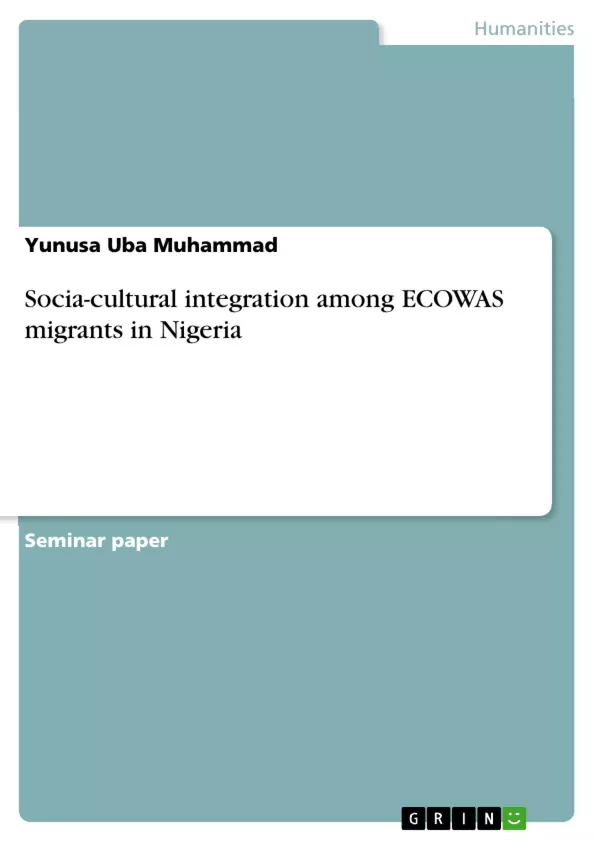Migration, which is the movement of people from one geographical location to another has remained at the centre of West African history for several centuries. Its centrality has been attributed to its role in influencing the socio-cultural and economic integration of the sub-region. A migrant can be described as a person who uproots himself from his original home and moves to a new place where he settles and establishes new links. This paper examines the socio-cultural integration that occurs among ECOWAS migrants in Nigeria. In order to examine the extents to which migration promote socio-cultural integration and peaceful co-existence among ECOWAS nationals and Nigerian citizens; the paper began with conceptual clarifications of the key terms of migration, migrants, integration as well as socio-cultural integration were reasonably discussed. It then reviewed the Nigerian migration policy as it relate to ECOWAS protocol on free moment of persons. It specifically dwelt extensively on the impacts and consequences of socio-cultural integration of ECOWAS migrants in Nigeria. The socio-cultural integration variables discussed in the paper include local language, religion, intermarriage, friendships/social network, family organization structure or cultural values, traditional food and traditional mode of dressing, among other.
Inhaltsverzeichnis (Table of Contents)
- Abstract
- Introduction
- Conceptual clarification
- The Concept of Migration
Zielsetzung und Themenschwerpunkte (Objectives and Key Themes)
This paper aims to investigate the socio-cultural integration of ECOWAS migrants in Nigeria, specifically focusing on how migration contributes to peaceful coexistence between ECOWAS nationals and Nigerian citizens. It explores the concept of integration and socio-cultural integration, examining the factors responsible for migrants' integration in Nigeria. Additionally, the paper analyzes the socio-cultural consequences of ECOWAS migrants living in Nigeria, including its benefits and implications.
- Socio-cultural integration of ECOWAS migrants in Nigeria
- Impact of migration on peaceful coexistence
- Factors influencing migrants' integration
- Socio-cultural consequences of ECOWAS migrants in Nigeria
- Strengthening mutual understanding and accommodation for integration
Zusammenfassung der Kapitel (Chapter Summaries)
- The abstract provides a brief overview of the paper's focus on examining the socio-cultural integration of ECOWAS migrants in Nigeria.
- The introduction delves into the concept of migration and its historical context, highlighting the natural tendency of humans to move in search of better opportunities. It introduces the complexities of migration in modern Nigeria with diverse nationalities and ethnic groups seeking residence in the country for various reasons.
- The chapter on "Conceptual Clarification" provides a detailed explanation of the concept of migration, defining it as the movement of individuals or groups across administrative or political borders with the intention of permanent or temporary settlement. It emphasizes that migration can be both internal and external, driven by factors such as poverty, unemployment, and political crises.
Schlüsselwörter (Keywords)
The key themes of this paper revolve around migration, integration, socio-cultural aspects, peaceful coexistence, and the impact of ECOWAS migrants on Nigerian society. It delves into the complexities of cultural integration and the challenges of maintaining a cohesive society amidst diverse populations.
Frequently Asked Questions
What is the focus of the study on ECOWAS migrants in Nigeria?
The study examines how migration among ECOWAS nationals promotes socio-cultural integration and peaceful co-existence with Nigerian citizens.
How is migration defined in the context of West African history?
Migration is seen as a central historical process involving the movement of people across borders for permanent or temporary settlement, often driven by economic or political factors.
What are the key variables of socio-cultural integration discussed?
Key variables include local language acquisition, religion, intermarriage, social networks, traditional food, and modes of dressing.
What role does the ECOWAS protocol play in Nigerian migration policy?
The protocol facilitates the free movement of persons, which is a cornerstone for economic and socio-cultural integration within the sub-region.
What are the consequences of socio-cultural integration for Nigeria?
Integration leads to a more diverse society, fostering mutual understanding but also presenting challenges in maintaining social cohesion.
- Quote paper
- Yunusa Uba Muhammad (Author), 2020, Socia-cultural integration among ECOWAS migrants in Nigeria, Munich, GRIN Verlag, https://www.hausarbeiten.de/document/925387


